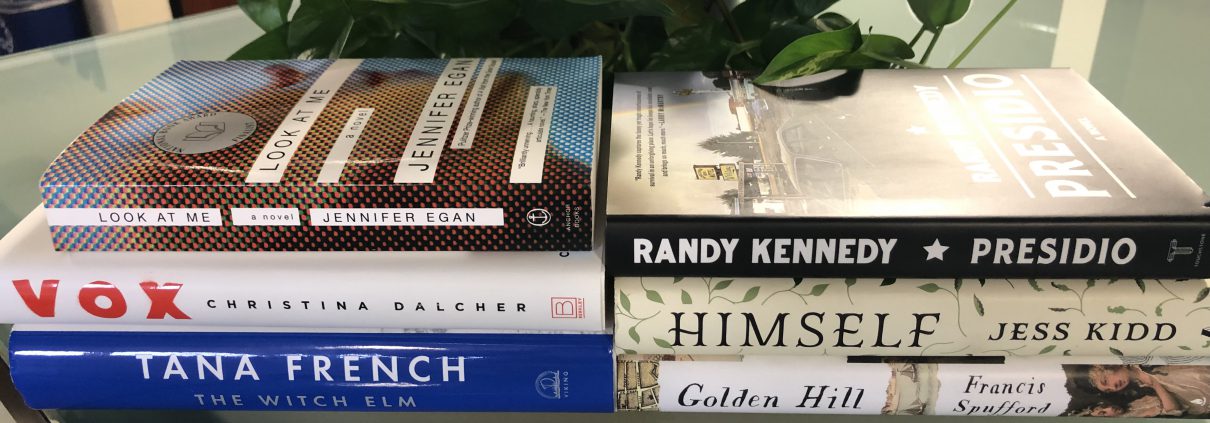Winter 2018 Rainy Day Reads
We couldn’t decide on the winter equivalent of a beach read. It couldn’t be snow related—it’s a push to call this time of year in San Diego “winter” as it stands. We settled on the optimistic, in drought-ridden California, with the hope that our winter would provide some rainy days. These are some of our picks, but if you’re got your own suggestions for books, movie, or TV, email Susan and let her know.
Himself
by Jess Kidd
The Guardian review
When we tell you the main character sees dead people, you may be thinking horror, but this book is a delight, requiring just a little suspension of disbelief, more along the lines of A Midsummer’s Night Eve. Featuring a charming small town cast of characters, set in Ireland, this novel is a mystery. True to the classic form, a stranger comes to town and trouble gets stirred up. When Mahoney’s talking to people, not quite asking questions, he’s certainly stirring them up amongst the villagers. And the biggest question quickly becomes what happened to Mahony’s teenage mother decades ago. Did she leave town, or was she murdered? It’s not clear any longer who left Mahony at the Dublin orphanage 25 years ago. As William Faulkner once wrote about small towns in the American South, “The past is never dead. It’s not even past.” And his small towns were only metaphorically haunted by ghosts, Kidd’s small town has literal ghosts sitting around everywhere, signaling, if not talking, to Mahony, so the truth begins to be clear. And you know when a long-dormant killer finds their secret may yet be revealed, more deaths are coming unless the crime is solved quickly. (yes, movie rights are sold.)
Golden Hill
by Francis Spufford
The New York Times review
We seem to have had a bit of a run on first novels in this post, but all the more reason for you to check out our picks and discover some new talent. Spufford’s had a distinguished career as a nonfiction writer, but this is his fiction debut. It starts 30 years before the founding of America. I guess we have a weakness for small town gossip in plots, because we’ve got another stranger come to town where contemplation of his motives stir up all kinds of trouble. In this case, the small town is an early New York City, and the rumors (understandably) circle around the 1,000 pound promissory note he’s got in hand. A rich stranger in town, named Smith, no matter how much the gentleman, can’t possibly be up to any good—at least for the local power structure. You wouldn’t think it to look at the description but Golden Hill is a page-turner. Luckily not a long book, because you’ll need to stay up late and finish it once you start reading.
Presidio
by Randy Kennedy
The New York Times review
When Lee Child (of Jack Reacher fame) writes the review in The New York Times, you have to pay attention—or at least you do if you’re a fan of the Jack Reacher books. And if that doesn’t sway you, he’s earned praise from Larry McMurtry, who has to be the reigning expert of Texas of the past. Kennedy doesn’t go all the way back to the old west, but this is a western, if set in 1970s Texas. Perfect for fans of the recent movie Hell or High Water, the novel tells a tale of small-town Texas panhandle life and small-time crime in the 1970s. The story is told partly through a journal looking back as well as the current events. When you stop to consider the reasons we—and our friends and family—go about our lives focused on the future, you realize life is very different for people whose only focus can really be on the present. This book is like the love child of J.D. Vance’s Hillbilly Elegy memoir and Larry McMurtry’s Berrybender Narratives and is well worth your time.
The Witch Elm
by Tana French
The New York Times review
Fair warning: If you’re a fan of all of French’s previous books, collectively known as the Dublin Murder Squad, this book isn’t part of that loose series. (The Dublin Murder Squad is an unusual series as each book tells a murder story from different squad members’ points of view, so you’re always seeing previous stories slightly recast—making it tough on hardcover fans who run out and buy every book and can’t remember the details a year later, but ideal for a vacation reader looking to binge on paperbacks). This novel gives us Toby, a privileged late-20s social media professional, who is only just realizing (maybe) how lucky he is. And then his home gets broken into and everything falls apart. The detectives and the doctors promptly tell him just how lucky he has been, but it doesn’t seem this crime will ever be solved. Toby’s luck goes to hell “gradually, and then all at once” as he goes to stay with a terminally ill uncle in an old home that’s been in the family for generations and a skull turns up in a tree in the garden. Here the mystery revolves around whether we (or Toby) can trust Toby’s narration, whether he’ll ever get back to where he started, and only secondarily about whose skull that is and how it got there. (Note that Susan has a weakness for unreliable narrators, which might make her an unreliable reviewer as a result.)
Vox
by Christina Dalcher
Publishers Weekly review
The premise is priceless, we’re sure a movie, if not a Netflix series, will be made. The book itself has weaknesses, but worth bearing with it just to ponder the overall idea. Women in American are now limited to 100 words per day. Any more and you get a shock from your monitoring bracelet. Sign language gets you hauled away, never to be seen again. Pens, paper, books—they are all locked up. Definitely a little heavy-handed. (Gotta ask how many people are both the parent of four and a genius researcher, even before the dystopia kicks in?) It’s in those details the author heaps things on, but the idea itself is fascinating, and the book is a fast read, so we’re still comfortable recommending it.
Look at Me
by Jennifer Egan
The Guardian review
We deliberately picked a review link from the re-release of Jennifer Egan’s Look at Me, circa 2001, on the heels of her rave reviews for A Visit from the Goon Squad. It’s a great novel, a riveting story, well-written. But when you consider how shockingly prophetic her discussion of identity remains—after the 17 ensuing years of the issues between public and private selves as magnified by social media’s rise. And while the book was written pre-9/11, the chameleon Z, a terrorist on a mission to open all eyes to the seductive lie of the American dream, is shocking not only because of the later events of 9/11 but because, oddly, he most resembles the bitter American conspiracy theorists of today, most of whom lay claim to patriotism as their sole purview. Amazing book in any scenario but the meanings have shifted a bit in the ensuing years, making it even more fascinating. Highly recommend this for book clubs—you could write a thesis, there’s so much here. Egan is one of the best American writers alive today—all of her books are page-turning, thought-provoking, with characters you don’t forget.



